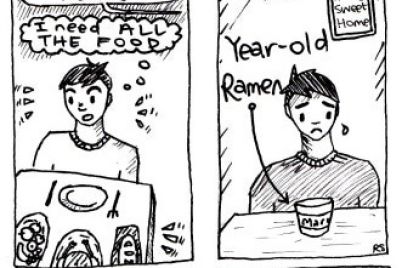
A Democrat and Republican clash over political beliefs at an anti-Trump protest.
By Haley Nagel
Contributor
The U.S. is more politically polarized than we’ve ever been. Americans with ideologically consistent values have increased over time and these values have become strongly associated with partisanship, according to Pew Research Center.
Partisan division has torn families, friendships, and relationships apart because people tend to believe their side is right, and the other is immoral.
“30 percent of conservatives say they would be unhappy if an immediate family member married a Democrat and 23 percent of liberals say the same about the prospect of a Republican in-law,” said a 2017 poll conducted by Pew Research.
The political parties were created for Americans to identify with an ideology, and voice their opinion on government policies. Now, ideology is too frequently used to determine personal character.
It’s normal for folks to seek out those who agree with them politically, but if they reduce their circle to just those individuals, how will they learn and grow? By denouncing one’s ideas and existence because they don’t identify with the same party, a productive conversation is denied. Taking all angles into consideration is crucial to forming a calculated opinion. Disagreements are beneficial; differing opinions are what shape us and pave the way to fruitful discussions.
Holding Republican or Democratic beliefs doesn’t inherently render an individual good or bad. There are so many other, better personality predictors, such as the way someone treats their server at a restaurant.
Agreeing to disagree with friends or family on political issues, while still considering them positive, pleasant people is possible.
Recent hate crimes have shown Americans that hostility doesn’t solve problems, and violence is actually counterproductive.
Becoming wrapped up others’ biases and opinions is easy. Assuming all right-wingers are wealthy, heterosexual white people; and all left-wingers are low/middle class, lazy snowflakes is also easy. Fortunately, it isn’t that simple. Putting initial judgement aside and looking further into someone’s background is what’s challenging.
As social media, especially Twitter, becomes increasingly aggressive, take a step back and view it for its light-hearted nature. Anyone can create an account, giving them the ability to speak to people they might not have otherwise might had an interaction with.
Although there are radicals in both parties’ out in the world, they’re amplified on social media because they get the most attention for being, well, radical. There’s a common narrative that radicals on both sides are more plentiful than they actually are.
Regardless of popular opinion, being friends with someone for years and coming to a disagreement on government policies is not a valid reason to terminate the friendship; and whatever goes on in politics, the media, or the government, remember that you have ultimate control over your life.

